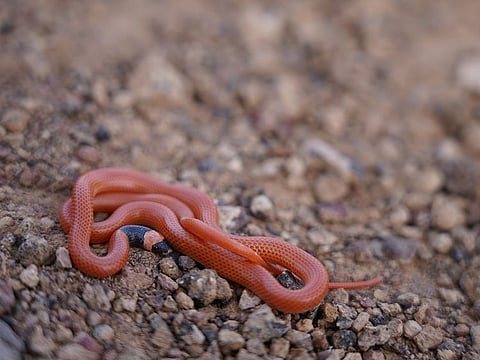New snake species discovered in Saudi Arabia's AlUla
The snake, Rhynchocalamus hejazicus, lives in the rocky and sandy areas around AlUla

AlUla: A new snake species, Rhynchocalamus hejazicus, has been discovered in the ancient oasis of AlUla, northwestern Saudi Arabia. This remarkable find underscores the region's rich biodiversity and solidifies its reputation as a natural treasure trove.
Distinct features
The newly discovered, non-venomous Rhynchocalamus hejazicus is a small, vibrant reptile, part of a genus predominantly found in Jordan, Yemen, and Oman.
With a striking reddish hue complemented by a distinctive black collar, this species is perfectly adapted to the sandy and rocky environments of the mountainous Hejaz region. As yet, much remains unknown about this nocturnal creature, but its presence in areas populated by humans illustrates the complex interactions between wildlife and local communities in AlUla.
Conservation efforts
The discovery of the Rhynchocalamus hejazicus has been met with enthusiasm by local conservationists, who see it as a vital component of the region's ecosystem.
Dr. Stephen Browne expressed the significance of the find, stating, "This is more than just identifying a new species. It underscores our ongoing efforts to protect the rich and varied ecosystems of AlUla and preserve this extraordinary oasis for future generations."
Commitment to nature
AlUla is undergoing a significant ecological transformation. Half of the region is now protected as nature reserves, including the vast Sharaan Reserve, which spans 1,500 square kilometers. Through reintroducing native species, restoring habitats, and adopting sustainable practices, AlUla is creating a thriving ecosystem.
The recent discovery of a new snake species highlights the region's ecological richness and reinforces its status as a sanctuary for both nature and history.
Sign up for the Daily Briefing
Get the latest news and updates straight to your inbox

